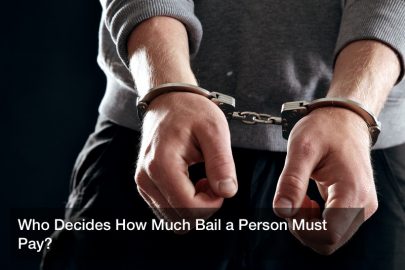There are many processes and steps involved with court hearings to have a trial and to sentence someone for a crime. For longer cases that can drag out for a time, a bail bond may be put in place by the judge. Decisions regarding bail and jail protocols and bail arguments usually rest with the judge overseeing the case that various attorneys representing both parties in the case.
A bail bond is set to ensure that the defendant can wait for their trial at home rather than in jail while keeping them from trying to flee the state or country in order to avoid their sentencing. The bail is paid to get them out of jail and the money will serve as a guarantee that they will show up in court for their hearing. It is a very common practice in many cases.
To learn more about the process and what bail bond resources are available and to get answers to questions about bail bonds how does it work and what are the legal obligations involved, your local bail bondmen are a great resource. Find your local bail bonding agent and see what they can do for you!
When there has been an arrest, many people are granted a bond amount. This amount allows them to pay the amount and to leave jail until their hearing. Courts are quick to get bond hearings for prisoners, and they often have their bail arguments scheduled within a day of the arrest. If someone was arrested and you aren’t sure how they got out, you may wonder how to find out who bailed someone out of jail. It may sound difficult, but it is actually easy to figure out how to find out who bonded someone out of jail. You can simply call the jail and ask them. Information like this is generally open to the public, as are arrest records. A quick call can tell you whether someone was bonded out and who did it.

If there isn’t enough money to pay the bail amount in cash, you can go to a bail bond company to get their help with the bond. They ask for a small percentage down in exchange for the full bail amount to be placed by the bail company. If someone is arrested while out on bail, this usually results in their previous bail being revoked.
If you find yourself involved in the court system, it is important that you understand how bail works. You’ll often need to find out how to pay someone’s bail. You might do this with your own money or by working with bail companies. These companies will put up the bail in the form of a bond, which you’ll then pay for by paying the company a fee. But once you have the bond in hand, you just need to find out how long after the bond is posted are you released. From there, you or your loved one will be able to go home until the trial.

However, it is important to understand your responsibilities, whether you are the defendant or the person whose name is on the bond. If the person is arrested while out on bail, they lose the bond and end up in worse legal trouble. Even if you aren’t the person who was arrested, they still know how to find out who bailed someone out of jail. So you might end up on the hook for the money owed to the bail company.
To ensure an accused individual does not flee, bail bonds are put in place. However, the system has been unjust, especially for poor people. Money has shown to be an incentive to ensure people get to court. Nevertheless, how can we justify it when bail standards are set without considering an individual’s ability to pay the money?
There are various problems with the bail system. The painful truth is that the system has not been designed to be fair or efficient for the accused. The system determines the amount of bail to be paid depending on the severity of the crime and the accused’s criminal record. What should be done to ensure justice is determining bail based on a person’s assets or income.
Most poor people look for the bail bond to get out of jail. The firms that provide these loans ensure the bail bond interest rate is low enough. Hence, a person does not have to worry about the high cost of bailing another one out.
Sometimes a person can have a bail pending appeal to give the court time to review the case. In this instance, the sentence passed can be suspended. Instead of the bail, there are other ways the court can ensure a person appears in court.

While the amount of bail required in a particular case is ultimately decided by the judge, it depends on a number of factors. This includes the severity of the crime, the likelihood of the defendant fleeing, and the likelihood of them committing more crimes. And once the judge determines what the bail will be, the decision of how to get jail bail money arises. If you need help paying bail to get out of jail or posting bail for someone else, you’ll need to consider bail bonds. Bail bonds are a loan for the amount of the bail set by the judge. You put up collateral and pay interest, but it covers the bail. In order to do this, you’ll need to know how to find a bail bondsman. Bail bondsmen work in many communities, so it is possible to look them up and find one that will work for you. You can shop around if you have time, but if you need jail bail money quickly, you’ll likely have to rely on the bondsmen closest to where you are. If you are wondering how to become a bail bondsman in Memphis TN, or in any other location, you will first need to understand what exactly bail is.
What is Bail?

Bail is an amount of collateral that must be paid in order for a defendant to be released from jail prior to their court case. Defendants paying bail are agreeing to a set of conditions they must abide by and promising they will return for their appointed court date. The money may be returned to them at some point but if they violate the conditions it will forfeit.
Who decides how much bail a person must pay?

Once arrested and charged, a person may be released from jail if a judge allows the posting of bail. So who decides how much bail a person must pay? First, how is bail determined? Most importantly, how does getting bailed out of jail work? The amount of bail that must be paid is determined by three things:
- Severity of the alleged offense
- Likelihood of committing additional crimes
- Chances of fleeing

Judges will examine these and other factors to set bail at any amount that is not objectively unreasonable. However, if they feel the accused is too dangerous, a flight risk, or has other concerns, bail can be denied altogether. This is allowed by the eighth amendment right which prohibits states from giving excessive bail but does not require states to allow bail in the first place.
How can you pay bail?

Bail can be paid in various ways including cash bail bond, personal bond for bail, the use of collateral such as a vehicle, or through a bail bond service. Often, bail is set for very large amounts normal people may not have, in this case, many people turn to bail bondsman or bail bond companies. These companies charge a fee, about 10%-20% of the bail amount to post bail for a defendant, referred to as a bond. Often times companies will monitor anyone they pay for in order to ensure they don’t lose that money and may even have them sign bail bond terms and conditions. If the defendant violates the agreement or fails to show up for court, bail is forfeit and they may be pursued by a bail recovery agent, bail bond agent, or bounty hunter. If you’ve been wondering how does getting bailed out of jail work, realize that you may be technically free after paying bail, but you must abide by some restrictions. Failure to meet those restrictions could place you in worse trouble than you were in to being with.

It’s ultimately up to a judge to decide how much bail a person has to pay. How do they do this? They use three factors to decide: the severity of the alleged offense, the person’s likelihood to commit another crime, and whether or not the person is a flight risk. There are many ways to pay for bail, if it is granted during a bail custody hearing. The most common is with a bail bond. A bail bond is a refundable deposit that allows the person arrested to get out of jail until their court date. If the defendant is arrested while out on bail, sometimes referred to as bail and jail, it is almost a sure thing they won’t get out on bail for a second time. However, if the defendant doesn’t flee, get arrested again, and shows up for their court date, the bail bond is refunded. However, the bail bond interest rate paid to the bondsman is still the defendant’s immediate responsibility, which is typically 10 percent of the entire bail amount. When learning how to become a bail bondsman in Memphis TN you first will need to learn about much you can be expected to hold back from a returned bond.
More:
0 bail bonds, 10 of bail bond, 100 000 bail bond, 100 000 bail crimes, 1000 secured bond, 10000 dollar bond, 15000 250000, 150000 bond, 1st 1 out bail bonds, 2 be free bonding, 2 million bond, 2000 bail, 200000 bail, 2500 bond is how much, 30000 bail bond cost, 30000 bond cost, 40000 bail, a signature bail bonds, a signature bond, bail b, bail cost for drug possession.

